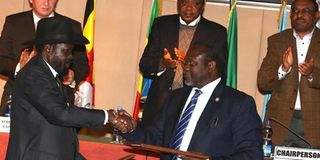How President Kenyatta sought to end infighting in Juba

South Sudan President Salva Kiir (left) and former Vice-President Riek Machar after signing a peace pact. Documents show that President Kenyatta crafted a deal for the two, which they later rejected. FILE PHOTO | PSCU
What you need to know:
- Pact followed meetings with Kiir and Machar.
- The two warring parties were to be equal partners and jointly lead a transition process.
Full details of the deal crafted by President Uhuru Kenyatta but rejected by warring South Sudan parties can now be revealed.
The deal was presented weeks before the peace talks collapsed in Addis Ababa earlier this month where President Kenyatta had appealed for a truce and argued for a “pragmatic” way of saving the region from instability.
A document seen by Sunday Nation shows that President Kenyatta had convinced rebel leader Riek Machar to sign a commitment to governance reform that would eventually lead to a transitional government.
Titled Principles of Power Sharing and Co-Leadership for the Republic of South Sudan between the Two Principals, the document proposed a framework under which South Sudan would emerge from the war with Dr Machar and President Salva Kiir sharing power ahead of elections.
“South Sudan requires a legitimate and functioning government that [can] spearhead the institutionalisation of comprehensive democratic reforms,” says the declaration dated January 26, 2015.
“South Sudan requires an urgent solution of the conflict. Genuine power-sharing between the two principal parties to the conflict is a categorical imperative,” it states.
President Kenyatta’s argument was that the violence in Juba was causing irreparable damage to the country. He feared the impact could spread to Kenya and other countries in the region.
The two South Sudan parties were to be equal partners and would co-lead the transitional government which would give South Sudan time to reform its system of governance, bring war perpetrators to justice, boost security systems, rebuild the economy and establish proper electoral systems.
This framework document was put before Dr Machar when he met President Kenyatta in Nairobi at the end of January, and he signed.
On Thursday, Dr Machar confirmed that he had signed the deal as part of his position on how to address the violence and instability.
“The two warring parties would benefit from the leadership of Kenya on the reform agenda our delegation has been proposing for implementation,” Dr Machar’s spokesman James Gatdet Dak said on Thursday.
“Being the rapporteur for the Intergovernmental Authority on Development (IGAD) and president of a country which not only has experience in South Sudanese conflicts, it is important that our chairman, Dr Machar, seeks his advice and active participation in the peace process,” he added.
ACCEPT DETAINEES
The proposal followed a successful deal between President Salva Kiir and 11 political detainees who were staying in Kenya. When President Kiir came to Kenya last month to attend an EAC meeting, President Kenyatta prevailed upon him to accept back the detainees as part of reforms in the ruling SPLM party.
The detainees had been living in Kenya since last year when Juba released them.
But when a similar proposal for power-sharing was tabled in Addis early in March, the negotiating parties disagreed, with President Kiir insisting he would not share power with Dr Machar.
On Thursday, Juba said it valued President Kenyatta’s approach to save the peace process but blamed rebels for shifting goal posts.
“President Kenyatta has always done his best to resolve the problem but power sharing did not cause the collapse of the talks,” South Sudan Deputy Head of Mission in Nairobi James Morgan said.
“It was rebels asking to have two armies in one country and have 50 per cent of power. South Sudan has 64 tribes; what would the rest get?”
Juba was engulfed in violence in December 2013 when rebels loyal to former Vice-President Riek Machar staged a failed coup against President Salva Kiir.




